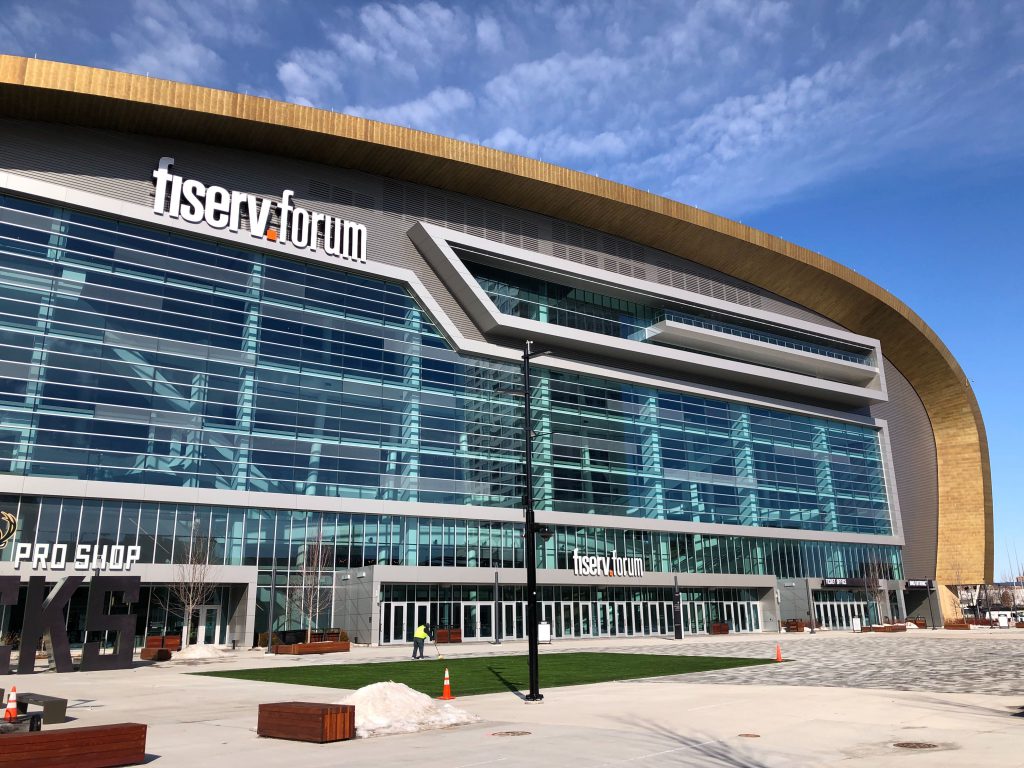State’s Sports Teams Hope For Comeback
More than 7,000 may have lost jobs due to partial shutdown of college and pro sports teams.
The Green Bay Packers are a few weeks away from embarking on a playoff run — potentially as the NFC’s number one seed. The Milwaukee Bucks just re-signed their MVP-winning star and hope to be in the running for an NBA championship while the Milwaukee Brewers are poised to continue competing for division titles.
That’s the state of Wisconsin professional sports on the field, but off of it, the COVID-19 pandemic has harmed the financial prospects of the teams and the nearby businesses such as bars and restaurants that live off the crowds that come with live sporting events — as well as the livelihoods of the thousands of people who work in and around sports.
At a virtual newsmaker event held by the Milwaukee Press Club, four of the state’s sports executives detailed how the pandemic has upended the sports world and the future of their teams.
“I would say the biggest challenge is literally trying to navigate financially through a season when you generate no admissions revenue, which for the Brewers is our number one source of revenue,” Rick Schlesinger, president of business operations for the Brewers, said. “And obviously, dealing with the loss of employment for so many full time and part time workers who work 81 games at Miller Park, and whose livelihoods depend on baseball games, not just the people at the ballpark but the surrounding restaurants, hotels, bars, all the businesses that were impacted negatively by the absence of in-game attendance.”
Green Bay, the smallest city in the country with an NFL team, relies heavily on the tourism and economic activity the Packers bring. The prospect of a deep playoff run, with the team playing at Lambeau field — as is currently possible — would normally bring millions of dollars in ticket revenue, beer sales and hotel bookings.
Packers CEO Mark Murphy said having fans in Lambeau for the playoffs would be great, but the health concerns of players and the community need to be the first priority — especially considering how many people would come to Green Bay from out of town to see those games in person. For the last few games, the Packers have been allowing the invited guests of staff to watch games in person, though with a limit of around 500 people in a stadium that can hold more than 80,000.
“A lot of that’s going to depend on the status of the virus and the views of our local health officials,” Murphy said. “So we’ve got two more home games, we’re going to continue with invited guests. And then hopefully we get the bye and that gives us a little more time and we’d love to have fans, but we’re not going to put the community at risk, or our players.”
For most of the season, Green Bay has been the NFL city with the highest rate of COVID-19 infection.
Other teams, like the Packers and Brewers, play their games outside, allowing a small number of fans to come watch games easily while social distancing. The Bucks and the NBA play indoors which, Bucks President Peter Feigin said, makes the logistics more difficult.
The NBA is set to start its season in less than two weeks and Feigin said allowing spectators to attend again will depend on figuring out systems to track COVID-19 testing and vaccination before a person can buy a ticket.
“I deal with an inside-the-arena format and environment which is even more challenging,” said Feigin, who was on the press call as news broke that Giannis Antetokounmpo had signed a five year $228 million contract extension. “What does vaccine passports and tracing look like in the future? What does testing look like and how do we track that, how do we integrate it with our ticketing systems and how do we continue to kind of promote safe and healthy environments? We’re all kind of under the same umbrella here in Wisconsin; I don’t see a horizon in the next four to eight weeks that really changes, kind of where we are with attendance.”
Reprinted with permission of Wisconsin Examiner.
More about the Coronavirus Pandemic
- Governors Tony Evers, JB Pritzker, Tim Walz, and Gretchen Whitmer Issue a Joint Statement Concerning Reports that Donald Trump Gave Russian Dictator Putin American COVID-19 Supplies - Gov. Tony Evers - Oct 11th, 2024
- MHD Release: Milwaukee Health Department Launches COVID-19 Wastewater Testing Dashboard - City of Milwaukee Health Department - Jan 23rd, 2024
- Milwaukee County Announces New Policies Related to COVID-19 Pandemic - County Executive David Crowley - May 9th, 2023
- DHS Details End of Emergency COVID-19 Response - Wisconsin Department of Health Services - Apr 26th, 2023
- Milwaukee Health Department Announces Upcoming Changes to COVID-19 Services - City of Milwaukee Health Department - Mar 17th, 2023
- Fitzgerald Applauds Passage of COVID-19 Origin Act - U.S. Rep. Scott Fitzgerald - Mar 10th, 2023
- DHS Expands Free COVID-19 Testing Program - Wisconsin Department of Health Services - Feb 10th, 2023
- MKE County: COVID-19 Hospitalizations Rising - Graham Kilmer - Jan 16th, 2023
- Not Enough Getting Bivalent Booster Shots, State Health Officials Warn - Gaby Vinick - Dec 26th, 2022
- Nearly All Wisconsinites Age 6 Months and Older Now Eligible for Updated COVID-19 Vaccine - Wisconsin Department of Health Services - Dec 15th, 2022
Read more about Coronavirus Pandemic here






















